BARBARA KLEIN:
I'm Barbara Klein.
STEVE EMBER:
And I'm Steve Ember with EXPLORATIONS in VOA Special English. The Vatican in Rome, Italy, is the world headquarters of the Roman Catholic Church. But the Vatican is more than a religious center. Over the centuries, church leaders gathered priceless objects including cloth textiles, books, documents, paintings and sculptures. Come with us now as we join the millions of people every year who explore the Vatican Museums.
(MUSIC)
BARBARA KLEIN:
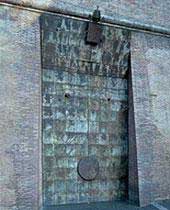
As you enter the Vatican Museums, you pass through large sculptured doors. When the light shines just the right way, bronze squares in the doors seem to catch fire. The artist Cecco Bonanotte created the doors in 1999. He produced them for the opening celebration of the new entrance to the Vatican Museums in 2000. But other works here are much older.
There are containers with beautiful artwork created more than 2,000 years ago. Statues and paintings show heroes of ancient Troy and Athens. Paintings and cloth textiles reproduce the world of the 16th century.
Sometimes experts remove objects to repair and restore them. And some objects may be loaned to other museums. But there are always many interesting and beautiful objects to see at the Vatican Museums.
STEVE EMBER:
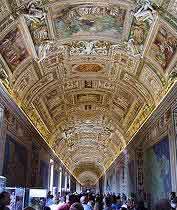
It is almost impossible to visit all the Vatican collections in one day. There are more than 20 museums and public art centers. Today we tell about a few of the most interesting works of art.
The Gallery of the Maps is a good place to start. Forty wall areas contain maps of the world as Italians believed it looked like in the 16th century. Ignazio Danti of Perugia painted the maps in the 1500s.
BARBARA KLEIN:
Another museum, the Gallery of the Tapestries tells picture stories in wall hangings. These tapestries are made of the materials silk and wool. They were designed from drawings by the artist Raphael and possibly his students. Works by Raphael deeply influenced painters of the Italian Renaissance. The period represented a rebirth of artistic development. There are more works by Raphael in other Vatican areas.
But at this moment, a border tapestry by Flemish artist Pieter van Aelst picturing the four seasons captures your interest. The artist represents spring with two young people in love. A woman holding wheat is summer. Van Aelst sees fall as small boys climbing grape vines. The image of a seated person almost fully hidden by clothing captures the cold and loneliness of winter.
(MUSIC)
STEVE EMBER:
Roman Catholic Church leaders established several of the Vatican Museums during the 18th and 19th centuries. For example, Pope Gregory the Sixteenth established the Vatican Egyptian Museum in 1839. Objects created long ago fill its nine rooms. The artworks were found in and around Rome. They had been brought from Egypt.
The first room in the Egyptian museum welcomes visitors to the world of the pharaohs who ruled ancient Egypt. You see a statue of Ramses the Second. He sits on a throne, a king's chair. He looks very much like a powerful ruler. A very tall statue of the mother of Ramses looks over another room in the Egyptian museum.
BARBARA KLEIN:
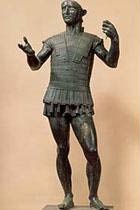
The Vatican Museums also exhibit objects from an ancient land called Etruria. This area is now in northern Italy. Most historians believe that Etruscan society reached its height more than 2,500 years ago. The Etruscans created fine art with terra cotta, or baked clay.
Pope Gregory the Sixteenth established the Etruscan Museum in 1837. The collection includes containers called vases and objects of bronze and gold. It also includes statues of full human bodies and sculptures of heads. In addition, you can see objects that added beauty to the Etruscan religious centers, called temples. For example, a horse with wings once guarded a temple. The horse still shows some of the colors the artist created so long ago: red, black and yellow.
(MUSIC)
STEVE EMBER:
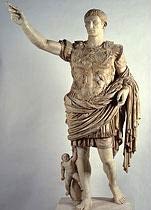
Next we visit the Chiaramonti Museum, established by Pope Pius the Seventh Chiaramonti. This museum contains almost 1,000 ancient works of art, including statues of Roman gods. We see a statue called "Augustus of Prima Porta." The Roman ruler holds his right arm high in the air. Art experts say the Emperor Augustus was making a victory sign. Or, the statue may have once held a weapon. The statue was found in 1863 in the ancient home of Livia, the wife of Augustus.
BARBARA KLEIN:
Now we are in the Pio-Clementine Museum, founded by Pope Clement the Fourteenth in 1770. It is filled with Greek and Roman sculptures. One interesting statue is the Laocoon. The subject of the statue is from the "Aeneid" by Virgil, the most famous poet of ancient Rome. The poem is about the ancient war between Greece and Troy. The sculpture shows the Trojan priest Laocoon and his sons being crushed to death by sea snakes. The artists have made the terrible pain of the dying man and boys look very real.
STEVE EMBER:
Some visitors believe the works of Raphael are the most beautiful in the Vatican Museums. In 1508, Pope Julius the Second asked Raphael to cover the walls and ceiling of some of the Pope's private living areas.
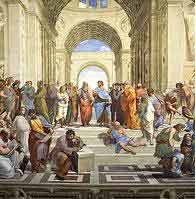
One of Raphael's most famous paintings is "The School of Athens." It shows famous Greek thinkers and scientists. Raphael painted these people teaching and learning around the philosophers Plato and Aristotle.
Some experts say Raphael painted the image of the artist Michelangelo into this work. That may be true. Michelangelo was clearly in Raphael's thoughts at times. In a way, the two men competed. Pope Julius probably understood that the competition incited each man to the height of his greatness.
Julius so liked the work of Raphael that he told the artist to remove earlier paintings in the Pope's living areas. But Raphael understood the value of the work of others. He saved the work of great artists including Perugino.
(MUSIC)
BARBARA KLEIN:
We have saved the best for last. We enter the official private church of the popes, called the Sistine Chapel. It is the most famous part of the Vatican Museums. Pope Sixtus the Fourth had it built in the 1470s. Major events involving Roman Catholic Church leaders take place in the Sistine Chapel. For example, in April of 2005, top church officials held a historic meeting in this center. They chose a new pope, Benedict the Sixteenth. But the chapel also is home to some of the finest paintings ever created.
STEVE EMBER:
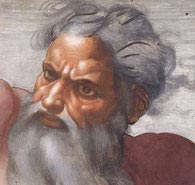
On the side walls are paintings by the greatest Italian artists. But when we enter the Sistine Chapel, we look up to see the most beautiful ceiling in the world. In 1508, Pope Julius the Second asked Michelangelo to paint the ceiling of the Sistine Chapel. The result was a series of paintings called "The Creation of the Universe" and the "History of Humanity."
The ceiling is an artistic wonder. Michelangelo made more than 50 paintings that show more than 300 people. The paintings show God creating Adam, the first man. They also show stories from the Christian holy book, the Bible. It took Michelangelo four years to paint the ceiling. He painted it while lying on his back.
BARBARA KLEIN:
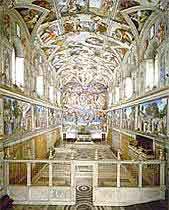
Almost 25 years later, Pope Paul the Third asked Michelangelo to paint the wall of the Sistine Chapel above the altar. This is the structure where religious ceremonies are carried out. Between 1536 and 1541, he painted "The Last Judgment." This huge painting includes 300 people. Christ is shown as the supreme judge of good and evil. The painting shows some good people rising to heaven. But bad people are condemned.
They are shown falling or being dragged by ugly creatures into hell where they are tortured forever. Some people find this work beautiful. Others find it frightening.
But many people believe that the ceiling of the Sistine Chapel and the "Last Judgment" are the most famous works of art ever created.
STEVE EMBER:
Now it is time to come back to the world of the 21st century. There are many other wonderful works in the Vatican Museums. But they will still be there on another day, and many days to come.
(MUSIC)
BARBARA KLEIN:
This program was written by Jerilyn Watson. It was produced by Mario Ritter. I'm Barbara Klein.
STEVE EMBER:
And I'm Steve Ember. Join us again next week for another EXPLORATIONS in VOA Special English.
A museum better known as the US Capitol
Shakespeare was a producer and actor and, oh yes, a writer
Eleanor Creesy: she guided one of the fastest sailing ships
Visiting the Galapagos and the unusual creatures that live there
(來源:VOA 編輯:陳丹妮)
